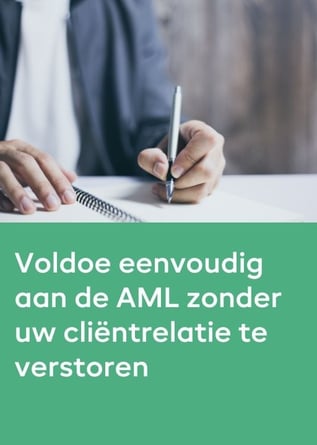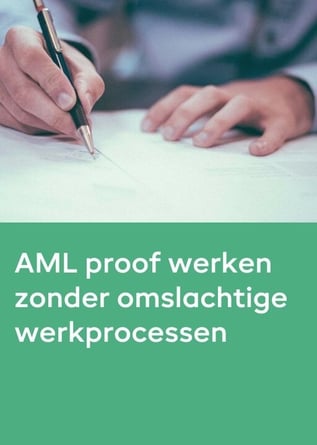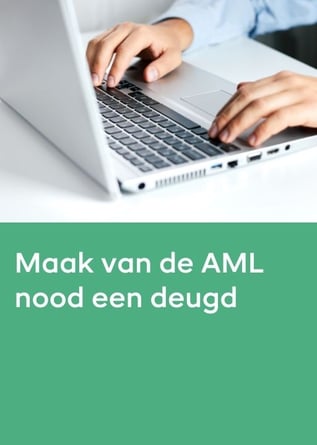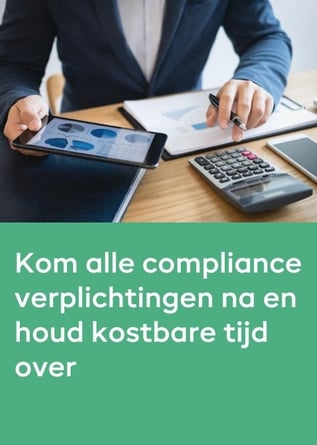- Producten
- RegLab voor ...
- Kenniscentrum
Download het whitepaper >
We zetten tien fabels over witwaspreventie op een rij en geven praktische tips om je proces te verbeteren.
- Het bedrijf
- Boek een demo
Informatiebeveiliging
Wij begrijpen het belang van het waarborgen van vertrouwelijkheid, beschikbaarheid en integriteit van informatie binnen uw kantoor.
ISO 27001
RegLab begrijpt hoe belangrijk het is om de vertrouwelijkheid, beschikbaarheid en integriteit van informatie binnen uw kantoor te waarborgen. Daarom maken wij gebruik van de wereldwijd erkende ISO 27001 norm op het gebied van informatiebeveiliging.
Dit houdt in dat wij onze processen op een gestructureerde en gecontroleerde manier inrichten, om zo de risico's op het gebied van informatiebeveiliging te identificeren en te beperken. Hierdoor kunnen wij de vertrouwelijkheid, beschikbaarheid en integriteit van informatie binnen onze applicatie waarborgen.
Bij het gebruik van onze private cloud-based oplossing, hoeft u zich geen zorgen te maken over de veiligheid van uw gegevens. Wij zorgen er namelijk voor dat uw informatie op een veilige manier wordt opgeslagen en verwerkt, conform de ISO 27001 norm.
Neem gerust contact met ons op voor meer informatie.
What is RegLab’s cookie policy
You can find our cookie policy here.
Where is RegLab’s product infrastructure hosted?
Our product infrastructure is hosted exclusively within the European Union (EU).
How does RegLab encrypt data in transit?
We ensure that all sensitive interactions, such as API calls, logins, and authenticated sessions with the RegLab application, are encrypted in transit using TLS 1.2 or 1.3 with RSA 2,048-bit keys or stronger. Secure Sockets Layer and Transport Layer Security (SSL/TLS) encryption is available by default to protect your data. For more information, please visit the following link: https://www.ssllabs.com/ssltest/analyze.html?d=clientidentification.com
How does RegLab encrypt data at rest?
Data stored on our SaaS servers is encrypted using industry best practices. We employ a FIPS 140-2 validated cryptographic module for storage encryption. All data, including backups and temporary files created during query execution, is encrypted on disk. We use the AES 256-bit cipher as part of Azure storage encryption, with system-managed keys. This encryption is always enabled and cannot be disabled.
Can RegLab track changes to sensitive data?
Yes, we can track changes to sensitive data. Our application maintains detailed user logs, general system logs, and production logs. Additionally, important events are recorded in an audit trail within the application. This ensures that any modifications to sensitive data are tracked and documented.
Does RegLab ensure logs are tamper-evident and regularly monitored?
Yes, access to the audit trail and logs is secured and strictly limited to designated personnel only, ensuring that they are tamper-evident and regularly monitored.
Did RegLab define a backup policy?
Yes, we have backup policies in place. Redundant daily backups are automatically stored across our primary cloud storage providers.
Do the backups have defined recovery procedures?
We maintain comprehensive backup and recovery procedures, including automated backups and off-site storage, to safeguard your data and minimize downtime in case of any disruptions.
Are backups stored off-site?
Yes, our backups are replicated and stored in zone-redundant storage, within the European Union (EU).
Are backups encrypted using strong encryption algorithms?
Yes, we employ a multi-layered approach to data security. Backups are encrypted using AES 256-bit encryption, and we apply additional encryption at the field/row level for personally identifiable information, utilizing strong algorithms.
How can I perform my own backups of my data?
You can export all your data from our application into a CSV or Excel document at any time. If you need your data in a different format, please contact us to discuss available options.
What is RegLab’s uptime commitment?
We are committed to maintaining a high level of service availability, with an uptime of 99%.
Does RegLab have a ISO27001 certification?
We use the globally recognised ISO27001 information security standard. A certified auditor conducts an annual audit.
Does RegLab use adequate anti-malware software?
Yes, we ensure robust protection against potential threats by deploying sufficient anti-malware software. All RegLab devices are protected by Microsoft Defender.
Does RegLab deploy password protection solutions, such as encryption?
Yes, we employ robust password protection solutions, e.g. a password manager and encryption, which are enforced through Microsoft Intune policies. These security measures are mandatory and applied consistently across all employee devices to ensure comprehensive protection of sensitive information.
Has RegLab defined a policy for updating the components (software, libraries, etc.) of the application? How are vulnerabilities monitored?
Yes, to monitor and manage vulnerabilities, we have static analysis, dynamic analysis, vulnerability assessment, and dependency scanning tools in place. These tools help us identify and address potential security issues promptly, ensuring the integrity and security of our application.
Are the default authentication elements on equipment and services systematically changed?
Yes, the default authentication elements are rotated.
Are RegLab’s user and administrator accounts nominative?
Yes, we use named accounts for all administrative purposes.
Is an information security audit plan defined?
Yes, we maintain ISO27001 certification and adhere to a well-established Information Security Management System (ISMS) process, which includes security audits as a fundamental component. Additionally, we conduct system penetration tests to ensure the ongoing efficacy of our security measures.
How do I set up Two-Factor Authentication (2FA)?
The company's admin can turn on two-Factor Authentication (2FA) for the entire company. Do you have any questions about this? Get in touch with support. This can be done via the ‘Contact’ button underneath ‘Support’ in the application.
How do I set up Single Sign On (SSO)?
When your firm uses Azure Active Directory, it is possible to add RegLab as an enterprise application to it. The guidelines for this can be requested here.
Is the access to the application outside of SSO blocked?
When SSO is enabled for your firm, access without SSO is disabled.






